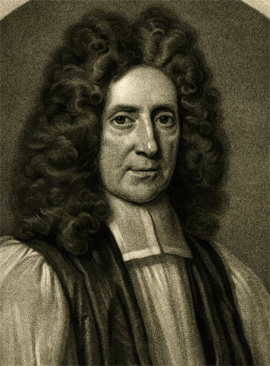| Profile | Major Works | Resources |
Richard Cumberland, 1631-1718.

English theologian and early utilitarian philosopher.
Richard Cumberland was born in London and educated in Cambridge (where he was associated with the 'Cambridge Platonist' movement), He moved into a clerical career and became Bishop of Peterborough in 1691.
In 1672, Cumberland published his principal his principal tract, De legibus naturae. It was crafted as a response to Thomas Hobbes's egoistic hedonism and legal positivism. Cumberland defended the concept of 'natural law' and dismissed the need of a 'legislator' or 'power'. The sentiments of pleasure and pain, prevalent in all animals, were evident, natural and powerful guides to individual and social conduct - teaching us, very directly, the consequences of actions, both practical and mystical (a mechanism of 'revelation' of morality directly to the 'soul').
While Cumberland argued that man always seeks pleasure and avoids pain, he disagreed that this "pleasure" was necessarily egoistic in a narrow sense. Our greatest pleasure, he argued, can be found in benevolence - the raising of the happiness of fellow men. In fact, he argued that as man is essentially both a social creature, as well as a rational one, then altruism is in his nature. Cumberland's identifies "Universal Benevolence" as the ultimate foundation of all morality. Moral virtue can be found simply by placing ourselves in 'harmony' with these sentiments.
In identifying universal happiness as "God's mandate" and the 'fountain of virtue', that no action can be deemed moral unless it improves universal happiness, Cumberland can be rightly regarded as the father of English utilitaranism
|
Major Works of Richard Cumberland
|
HET
|
|
Resources on Richard Cumberland
|
All rights reserved, Gonçalo L. Fonseca
